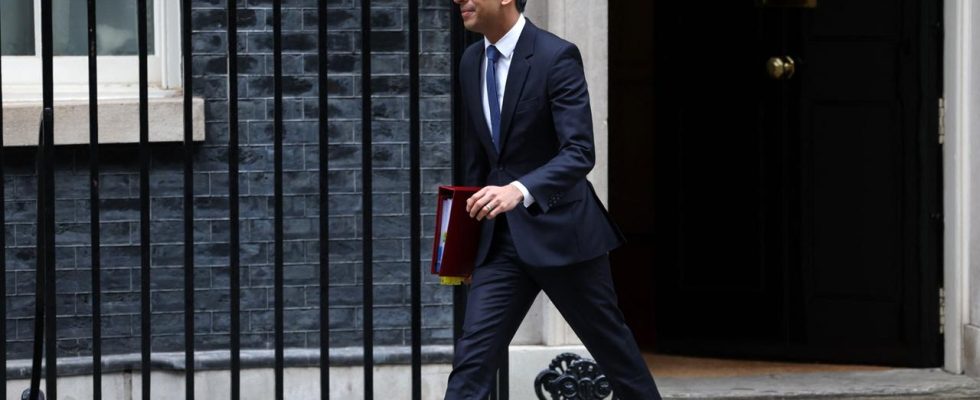For the right wing of the ruling Tories, Prime Minister Sunak’s law, which is intended to enable asylum procedures in Rwanda, does not go far enough. The British House of Commons will vote on it this evening. Is the next government crisis imminent?
For Prime Minister Rishi Sunak, the new year starts as the old one ended: with “psychodrama” in his party. This evening there will be a vote on a law that defines Rwanda as a safe third country and should finally make deportations to the African country possible. But for many MPs in the Conservative Party that didn’t go far enough. They tabled amendments, which were voted on yesterday.
Around 60 MPs positioned themselves against their own government’s legislative package – but without success. In the votes, the majority of MPs rejected the proposals.
Two deputy Conservative party leaders also voted against the government’s policy and resigned as a result. Lee Anderson was one of them. On “GB News” he explained the reasons for his resignation and why, in his opinion, stricter measures are necessary:
Anyone who arrives here illegally should have no right to apply for asylum or appeal. And no one should be able to simply go into hiding.
An unfulfilled promise
The revolt was led by Robert Jenrick. He is a member of parliament and former migration state secretary. He resigned from his government position at the beginning of December 2023 because the government’s proposals did not go far enough for him. “This law does nothing,” he said in the House of Commons. Jenrick fears that the new law could only encourage a few symbolic flights to Rwanda, but will not create the deterrence he believes is needed to reduce the number of people fleeing to Britain.
Less migration is one of the conservative government’s most important promises. But the recently published figures on net migration show that it is quite complicated to fulfill this promise.
The British economy, the healthcare system for example, is dependent on immigration. Refugees are still coming across the English Channel, although there are already significantly fewer than in 2022.
The ECHR should no longer play a role
Essentially, the rebels want the European Court of Human Rights (ECHR), for example, not to be able to stop the Rwanda flights. They argue that the majority of the British population supports this policy. Which cannot be clearly proven by several surveys.
In a survey by YouGov pollsters, 22 percent of respondents said the planned Rwanda policy should be implemented in this way. 17 percent would like to make changes to it, although it is unclear whether that means tightening it or weakening it. 36 percent were clearly against the plans, 25 percent had not yet formed an opinion.
Also a question of Separation of powers
Labor opposes the bill and will vote against it today. MP Stephen Kinnock, who speaks for the group on migration issues, criticized:
This policy is far too expensive, does not work and violates the law and our values. We want to maintain the separation of powers.
What Kinnock is talking about here is that the law aims to stop British courts from interfering in asylum procedures, even though there are massive concerns about the procedures and the situation in Rwanda. The British authorities recently granted asylum to people from Rwanda.
What wins – Faithfulness to principles or the fear of elections?
29 dissenters from the Tories would be enough to inflict a severe defeat on Sunak. But Despite the resistance to the government’s plans, including from within its own ranks, not all conservative opponents of the law are likely vote against it in Parliament, so Sunak is likely to get his majority.
There are two reasons for this: From the perspective of conservative MPs, this law is better than none. And no one wants a government crisis with a search for a new party leader or early elections in which, according to current polls, the Tories would suffer dramatic losses.
If the MPs in the lower house agree, the proposed law will go back to the upper house. The Conservatives do not have a majority there and there are numerous critical voices about the government’s plans. The debate, the “psychodrama,” is far from over.
Christoph Prössl, ARD London, tagesschau, January 17, 2024 1:13 p.m

